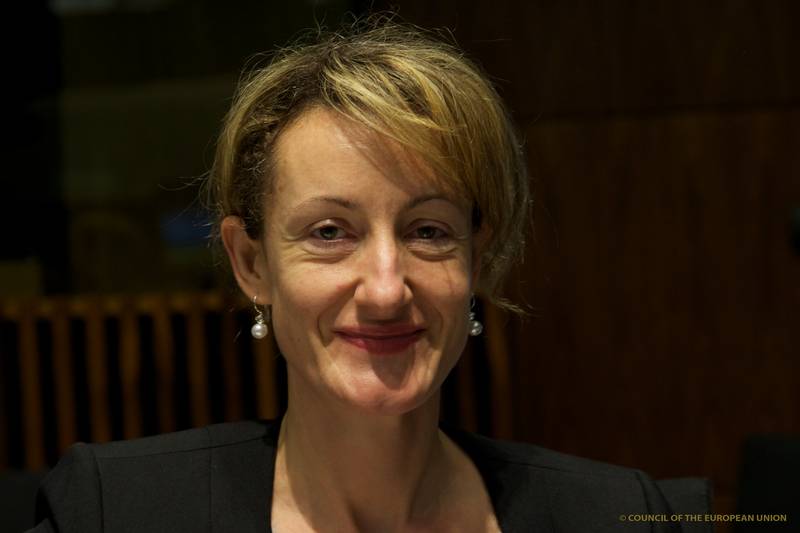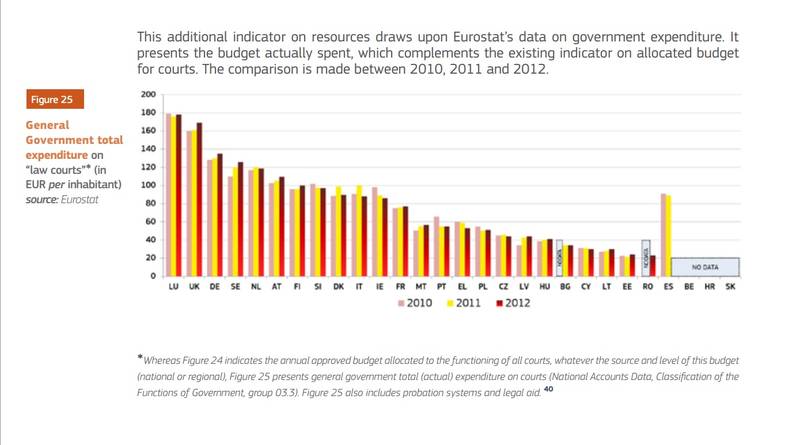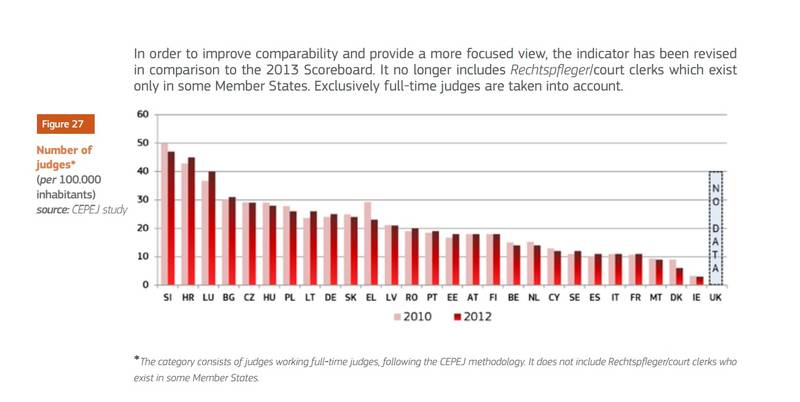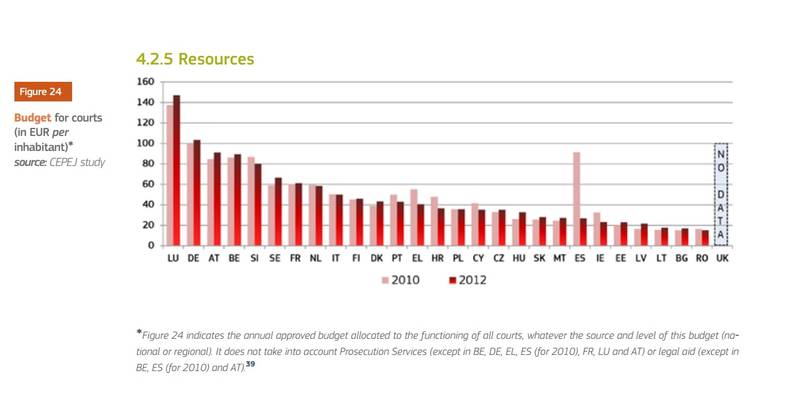What Comes First - Good Judiciary or Prosperity? This Is the Question in Bulgaria
Adelina Marini, June 25, 2014
 Is the availability of rule of law, effective and efficient judiciary, convincing fight against corruption a pre-condition for prosperity? That it is is a prevailing perception in the developed world shared also by the Council of Europe, the Organisation for Economic Cooperation and Development (OECD), EU, the governments of the richest countries in the world. This perception, however, is not quite common in Bulgaria, as it became clear from the discussion on the results of this year's Justice Scoreboard, organised by the Open Society Institute in Bulgaria. euinside is very happy to note that the discussion was inspired by our text on a similar discussion which took place in Zagreb a little after the European Commission published the scoreboard, though it was not organised by a non-governmental organisation but by the European Commission representation in the Croatian capital.
Is the availability of rule of law, effective and efficient judiciary, convincing fight against corruption a pre-condition for prosperity? That it is is a prevailing perception in the developed world shared also by the Council of Europe, the Organisation for Economic Cooperation and Development (OECD), EU, the governments of the richest countries in the world. This perception, however, is not quite common in Bulgaria, as it became clear from the discussion on the results of this year's Justice Scoreboard, organised by the Open Society Institute in Bulgaria. euinside is very happy to note that the discussion was inspired by our text on a similar discussion which took place in Zagreb a little after the European Commission published the scoreboard, though it was not organised by a non-governmental organisation but by the European Commission representation in the Croatian capital.
In Croatia, too, the view that a functioning judiciary and efficient fight with corruption is a pre-condition for economic prosperity is prevailing. However, the chief of the legal committee in the Bulgarian parliament, Chetin Kazak, a member of the DPS party (the party of Turkish minority), is of different opinion. During the discussion which took place in Sofia on April 29th, he doubted that the key motive for the outflow of investments (quite significant in the past year and a half) was the "existence of weaknesses in the judiciary, administrative or financial burdens, infrastructural or human resources". We should not forget, he said, that of primary importance to investors is the size of the market, institutional and macroeconomic environment.
Investments, according to him, are only one of the factors for economic growth and its dynamics. And, after all, companies invest first and only then they have to go to court to realise there is something rotten in the Bulgarian judiciary, is the conclusion that can be derived from Mr Kazak's statement. Unlike him, deputy Prime Minister and Minister of Justice Zinaida Zlatanova, who before that was a chief of the European Commission representation in Sofia, made a very direct link between the judiciary's efficiency and prosperity. The Justice Scoreboard shows very clearly, she said, that the most economically advanced countries, which means the EU's strongest economies, are in the first places in terms of judiciary efficiency. Those are Germany, the Netherlands, Denmark, Austria, Sweden, the minister added.
The link, by the way, can be seen with a bare eye. According to the macroeconomic indicators Mr Kazak was talking about, Bulgaria is an excellent performer but, still, it has weak economic growth and growing unemployment, as the data from the European Semester show. In the same time, the country is lagging far behind in the Justice Scoreboard in terms of investments in the judiciary. Besides, the country is under special monitoring from the very beginning of its membership precisely in the area of justice and fight against corruption as the situation there instead of improving has been deteriorating every year. In its latest report published in the beginning of the year, for instance, the Commission says quite bluntly that the Bulgarian judiciary is political dependent which is confirmed by the Justice Scoreboard as well where Bulgaria is second to last in the global scoreboard in terms of "perception for independence of the judiciary". First is Finland.
The annual approved budget for all courts in Bulgaria is 215 million euros. Per capita this is 29.46 euros which is significantly lower than the EU average (62.22 euros). Bulgaria belongs to the group of European countries that have the lowest level of investments in the judiciary. According to data from 2012, the number of professional judges in Bulgarian courts was 2 239 which represents 31 judges for every 100 000 people. The EU average is 19 judges. The annual salary of a first instance judge is 14 345 euros which is 3.2 times higher than the average annual salary in the country but is significantly lower than the EU average of 45 578 euros. The gross annual salary of a supreme court judge is 28 019 euros which is six times above the national average. This is what the data show of the European Commission for the Efficiency of Justice with the Council of Europe (CEPEJ), accompanying the European Commission's scorecard.
At the same time, in Finland, which has commensurate size of the population (5.5 million people) to Bulgaria's, the budget for the judiciary is 855 million euros which is almost 4 times more than what is invested in Bulgaria. The professional judges in courts in Finland are 981 which is 18 judges for every 100 000 people. Analysing the indicators for efficiency of the judiciary, however, it appears that the Finnish judiciary works rather efficiently. This means that adequacy is ensured between human resources and specific needs, the CEPEJ's analysis says. The gross annual salary of a first instance judge in Finland is 61 336 euros which is many times higher than the salary of their Bulgarian colleagues but, instead, it is only 1.6 times higher than the average salary in Finland. The judges from supreme courts get 3.3 times higher salaries than the average Finn or 128 770 euros.
 What the CEPEJ report does not say, however, is that the Bulgarian judiciary is facing bankruptcy, as the Bulgarian National Radio reported on June 19th.
What the CEPEJ report does not say, however, is that the Bulgarian judiciary is facing bankruptcy, as the Bulgarian National Radio reported on June 19th.
The above comparison gives only one side of the picture, which is how the country that tops all scoreboards in the world in terms of efficiency of the state, press freedom, purity from corruption, transparency of governance and government, etc, has been investing in its judiciary which, logically, performs excellently as well. The Netherlands's ambassador in Bulgaria, Tom van Oorschot, gave another part of the picture. According to the Bulgarian National Bank's statistics, The Netherlands is the biggest investor in Bulgaria. However, the reasons for this are not favourable business and judiciary environment in Bulgaria. In fact, he pointed out, a much more important indicator would be the answer to the question why much more companies have not invested in Bulgaria. The explanation of the phenomenon "high Dutch investments" is that the business environment in the Netherlands attracts many companies which through the country invest in Bulgaria.
The big multinational Dutch companies like Shell, ING, Philips, TNT are in Bulgaria for strategic reasons. Their business is profitable in Bulgaria, but is not a real big operation to them, Mr van Oorschot added. A large part of the Dutch companies are not Dutch in fact. Many of them are often registered only by mailboxes in the Netherlands for various reasons. They invest in Bulgaria through the Netherlands because of the independence of the judiciary, the ambassador said bluntly reiterating that the rule of law is very important to his country. This is evident also from the continuous Dutch blockade, supported by a growing number of member states, against Bulgaria's accession to the Schengen space in spite of the fact that it has fulfilled all the technical criteria.
That is why, Ambassador Tom van Oorschot said that he preferred to talk about the Cooperation and Verification Mechanism rather than the Justice Scoreboard which, generally, is quite clear. It does not matter how many road maps, action plans or strategies you make everything is reduced to whether there is transparency, accountability, reliability and integrity in the judiciary. It is of utmost importance the appointment of judges and legal authorities at large to take place in a completely transparent way. People and companies have to be able to trust the judges irreproachably. The same goes for public procurement tenders. They have to be completely transparent. Overall, the rule of law is of crucial important for economic development, the Dutch ambassador concluded.
 With much more liberal views appeared to be Britain's Ambassador Jonathan Allen, according to whom Bulgaria has performed much better in many indicators but what cannot be seen in the scoreboard is the political uncertainty. Protests are definitely a destabilising factor. Regarding investments, such instability is not a problem for the companies already operating in Bulgaria but for the newcomers on the market. As part of the political instability Mr Allen pointed to the fact that every time a mayor, regional governor or a national leader is replaced this causes enormous ripping sound for the concluded contracts. Very often, all contracts concluded by their predecessors are pronounced invalid. The UK ambassador also said that many colleagues of his in Sofia said that at least one company from their countries went through such an invalidation of a contract. Part of this, naturally, are the public procurement tenders, he added and gave the example not with any tender but with the one about the construction of the Bulgarian section of the South Stream pipeline project.
With much more liberal views appeared to be Britain's Ambassador Jonathan Allen, according to whom Bulgaria has performed much better in many indicators but what cannot be seen in the scoreboard is the political uncertainty. Protests are definitely a destabilising factor. Regarding investments, such instability is not a problem for the companies already operating in Bulgaria but for the newcomers on the market. As part of the political instability Mr Allen pointed to the fact that every time a mayor, regional governor or a national leader is replaced this causes enormous ripping sound for the concluded contracts. Very often, all contracts concluded by their predecessors are pronounced invalid. The UK ambassador also said that many colleagues of his in Sofia said that at least one company from their countries went through such an invalidation of a contract. Part of this, naturally, are the public procurement tenders, he added and gave the example not with any tender but with the one about the construction of the Bulgarian section of the South Stream pipeline project.
The tender took place between Christmas and New Year which is a very unfortunate example. The ambassador recommended MPs not to hurry when they draft legislation and to make preliminary feasibility and impact assessments. What is curious is that after the statements of the two ambassadors there were no questions from the audience, including journalists. The second part of the discussion was dedicated entirely on people working in the system. Some statements were too dry and it was hard to draw a conclusion that could help articulate a specific change, but there were others who were more specific and precise. Kalin Kalpakchiev, member of the Supreme Judicial Council and active blogger on the agenda of the judiciary, motioned the problem with the lack of statistical data - internal and external - for appropriate evaluation of the problems the judiciary has. Something that is included in the annual working programme of the Council.
To compare, Croatia has a lot of statistical data that make it easy for the government and the decision-makers in the judiciary to find the right solutions. Krassimir Vlahov, deputy chairman of the Supreme Court of Cassation, said that the quality of the judiciary would increase significantly if the use of information technologies increased. He also said several times that the problems of the judiciary are not only its own but should be resolved by the entire state. The efficiency of justice requires a broader approach involving the three estates, he added.
Lawyer Elly Christova, member of the Supreme Bar Council, pointed out several problems. One of the biggest, she said, is predictability. According to her, lawyers and their clients often have the feeling that they do not interpret the law in the same way as judges. Another problem are the costs of certain cases which has direct impact on the access to justice. She mentioned specifically the price of 4% of the value of the claim as judicial fee. As third she mentioned that the EU funds are directed for training in EU law to magistrates only, while a large part of the lawyers have no access to such training.
 The discussion in Sofia, organised by the Open Society Institute and inspired by a discussion in Zagreb organised by the European Commission representation, clearly shows the huge need for such events, especially against the backdrop of the problems Bulgaria has. There is no doubt that good judiciary is a foundation for prosperity because it guarantees investments and good business environment which, for its part, guarantees economic development and that is the means for increase of investments in the judiciary itself, education, research and innovation, etc. That is why, it is amazing that in Bulgaria, interested institutions are not inspired by the publishing of crucial studies and scoreboards by the Commission to explain why the problems are still not resolved. To compare, in Croatia, since the beginning of the year, two discussions have taken place. The first was right after the publication of the first ever report on corruption in the member states and the second was after the publication of the Justice Scoreboard. And Croatia is a brand new EU member without a special monitoring mechanism.
The discussion in Sofia, organised by the Open Society Institute and inspired by a discussion in Zagreb organised by the European Commission representation, clearly shows the huge need for such events, especially against the backdrop of the problems Bulgaria has. There is no doubt that good judiciary is a foundation for prosperity because it guarantees investments and good business environment which, for its part, guarantees economic development and that is the means for increase of investments in the judiciary itself, education, research and innovation, etc. That is why, it is amazing that in Bulgaria, interested institutions are not inspired by the publishing of crucial studies and scoreboards by the Commission to explain why the problems are still not resolved. To compare, in Croatia, since the beginning of the year, two discussions have taken place. The first was right after the publication of the first ever report on corruption in the member states and the second was after the publication of the Justice Scoreboard. And Croatia is a brand new EU member without a special monitoring mechanism.
 Entrance to the Berlaymont building | © EC - Audiovisual Service
Entrance to the Berlaymont building | © EC - Audiovisual Service | © European Union 2020, EC - Audiovisual Service
| © European Union 2020, EC - Audiovisual Service Commission President Ursula von der Leyen | © European Union 2019 - Source: EP
Commission President Ursula von der Leyen | © European Union 2019 - Source: EP